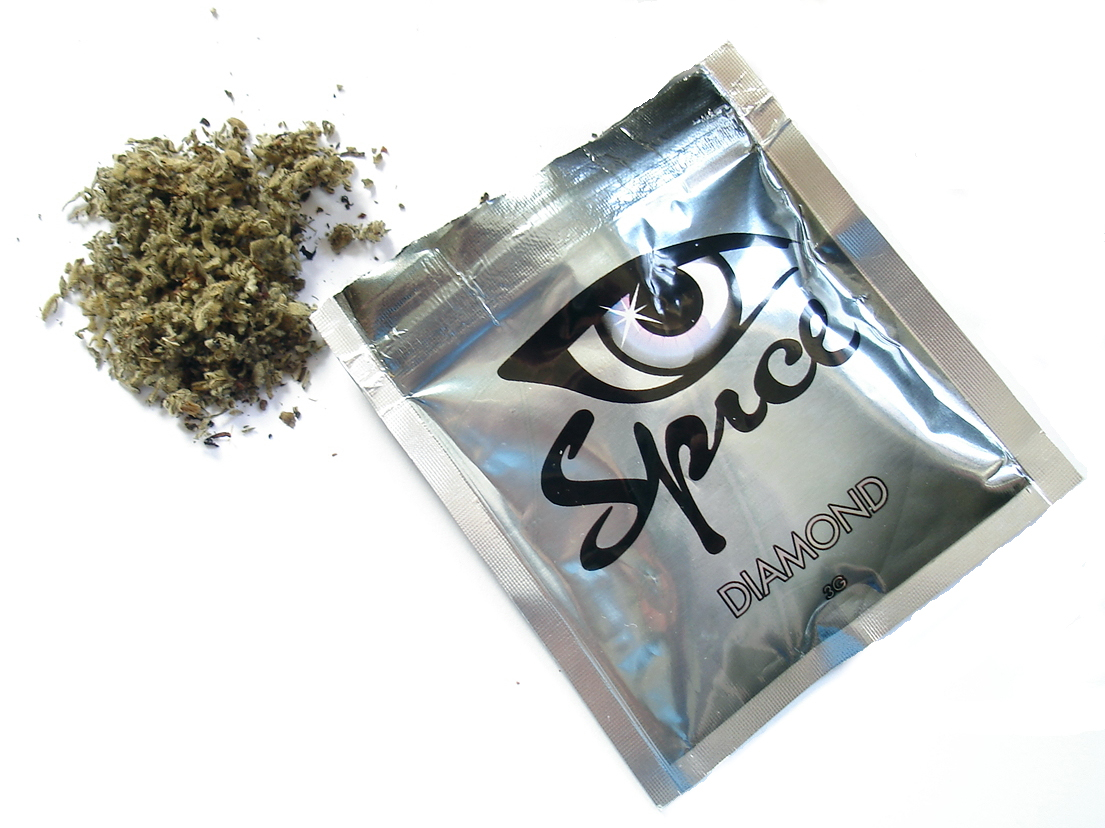There's No Such Thing as Synthetic Marijuana

By:
Synthetic marijuana is a misnomer, a term used to market and describe a substance that few people seem to fully understand. Spice, K2, K4, Black Mamba, Bombay Blue—these are only some of the brand names that have been collectively classified as synthetic marijuana, or synthetic cannabis, by media outlets, researchers, and drug enforcement agencies. But does that make it an accurate description? Not by a long shot.
One of the reasons that people continue to refer to this dangerous drug as synthetic marijuana is that the "synthetic" part, the chemicals sprayed on the herbal base, are designed to mimic the effects of select cannabinoids, components of marijuana that produce varying effects. The most commonly synthesized cannabinoid, THC, a psychoactive compound of marijuana, does not actually do what THC does to marijuana users; it has a wide range of effects on users, very few of which reflect the experience of getting high off pot.
"Synthetic marijuana is really a misnomer," Dr. Lewis Nelson, a medical toxicologist at NYU Langone Medical Center, told the New York Post. "It’s dangerous, and there is no quality control in what you are getting."
THC is short for tetrahydrocannabinol. It is a component of cannabis that responds to receptors we naturally have in our brain. Synthetic THC is made up of chemicals such as JWH-018, JWH-073, and HU-210; they might respond to natural cannabinoid receptors, but there is nothing natural about them. In fact, the purpose of using these chemicals is to bypass the legal system, which has deemed real cannabis federally illegal.
A federal crackdown on synthetic drugs has led to better regulation and enforcement of these products, but new versions appear frequently, manufactured largely in Chinese labs and imported to American suppliers. While you can't legally buy pot in states that prohibit its use, you can buy "synthetic marijuana" at gas stations and headshops all across the country. Just this week, the New York Times reported on the widespread abuse of K2 happening among the homeless community in Harlem.
So what are the differences between marijuana and "synthetic marijuana"?
For one, the synthetic substance is toxic. You can overdose. You can die after using it, either from acute toxicity or from doing something reckless like jumping out of a window. That's not hyperbole, either; people have been known to put themselves at physical risk and there have been 15 deaths associated with smoking Spice or K2 or any other number of synthetic drug brands so far this year.
In May, a 48-year-old man jumped out of his fifth-floor apartment window and died after smoking and drinking K4. Between January and April of this year, the Centers for Disease Control reported that monthly calls related to synthetic cannabis to the poison control centers around the country increased by 330 percent.
"The most commonly reported adverse health effects were agitation at 35.3 percent of calls, tachycardia (29 percent), drowsiness or lethargy (26.3 percent), vomiting (16.4 percent) and confusion (4.2 percent)," Reuters reported.
Marijuana, remarkably, is non-toxic. Nobody has ever died from smoking too much pot. (It's rumored that you would have to smoke at least double your body weight's worth of cannabis, with a high THC potency, within minutes to overdose on marijuana.) And while people certainly do dumb stuff or make bad decisions when they're high, you just don't hear about someone taking a few bong rips and jumping out of a window. Most people just fall asleep when they smoke too much. That said, it can also be scary and cause acute anxiety to be too high on weed; you won't die, but moderation is always advised.
Just for clarity's sake, here are a few visual examples of the differences between pot and the totally dangerous drug that is inadvertently associated with pot.
This is marijuana.
 Flickr/Katherine Hitt - staticflickr.com
Flickr/Katherine Hitt - staticflickr.com
This is Spice. (i.e. not marijuana.)
 Wikimedia - wikimedia.org
Wikimedia - wikimedia.org
It's an important difference, as many of ATTN:'s own readers have pointed out in the comments section of previous coverage that refers to these substances as "synthetic marijuana." We appreciate the vigilance, all.
